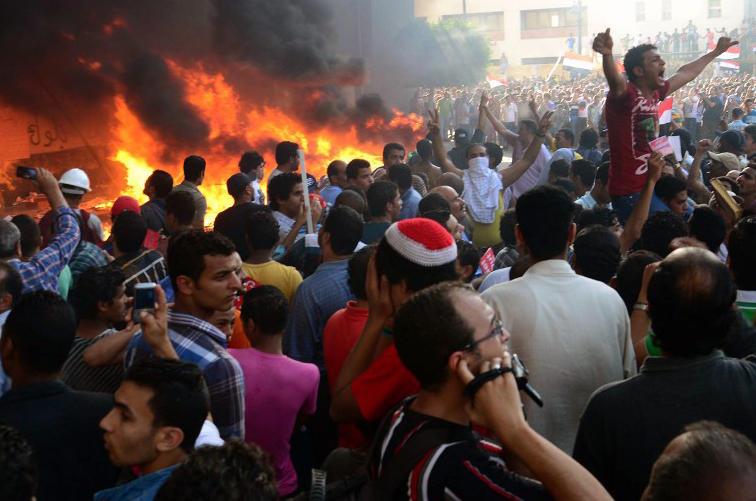
'Arab Spring' is coming to Persian Gulf. Peacefully.
By Azer Ahmadbayli – Trend:
Amazing things are taking place in some of the Arab states of the Gulf distinctive by their conservative views. Qatar has recently said that Israeli soccer fans welcome at 2022 World Cup and…drinking alcohol would be tolerated, though not in public.
Last month, Bahrain's King Hamad bin Isa Al Khalifa reportedly said he has grown "tired" of Arab states' boycott of Israel and called for diplomatic ties to be established with the Hebrew state. He also said that Bahraini citizens were free to visit Israel.
Now it has come to Saudis.
Saudi Crown Prince Mohammed bin Salman, being himself a highly educated and intelligent person, probably has good advisers as well. His remarks during a Future Investment Initiative summit in Riyadh stunned the world.
His leading idea can be described as 'modernization plans to wean the country off oil, attract foreign investment and diversify the economy.'
However, two things have electrified the public most of all – 'return to a country of moderate Islam that is open to all religions and to the world', and colossal scale of a new project to build a city of future on the Red Sea coast at the junction of three states –Saudi Arabia, Egypt and Jordan.
It comes interesting how those statements could be taken for by the majority in Iran, because both Iran and Saudi Arabia have ambitions to lead the Islamic world as well as the Middle East region.
The Sunni Saudi Arabia is a birthplace of Islam with holy shrines of Mecca and Medina. Iran is a mainstay of the world Shi'a Muslims with their Najaf and Kerbela holy shrines located in the neighboring Iraq.
Iran has about 90 percent of Shi'a population while Sunni make about 90 percent of Saudi Arabia. Both stand at outermost positions in interpretation of Islamic dogmata.
Now we see that one of the poles declared its shift to the moderate style of supervision over people's life. This is a ground for separation of state and religion some day in the future, however today it sounds unbelievable. In any case, it remains to be seen if 'little Prince' continues the strategy, by changing words to deeds.
Allowing a month ago Saudi women driving cars was in fact a revolutionary step for the Kingdom, but not sufficient for general audience to undergo mental shock. In Iran, for instance, the news was taken quietly as women's driving is usual in Iran's social life for many decades.
But if Saudi Arabia abolishes the capital punishment in foreseeable future, it will be a bombshell for many Muslim societies, including that of Iran.
In 2016 Iran and Saudi Arabia were among top three countries with allowed executions, in accordance with Amnesty International statistics. Iran alone accounted for 66 percent of all recorded executions in the Middle East and North Africa region. The overall number of executions carried out in Iran, made at least 567.
Therefore it can cause mixed and, in a way, unforeseen reaction in Iranian society.
But religious issues will not have such an effect as economic ones could.
In a book 'Post-revolutionary politics in Iran' it is noted that Japan had been a country of major Iranian interest long before the Revolution but it gained centrality in Iran's foreign policy after 1979, particularly because Japan had no political aspirations and commitments in its region. Tehran saw Japan as a bright sample of eastern nation's ability to modernize and was making efforts to acquire Japanese experience. Today we can't compare the two countries. GDP in Japan was worth $4.383 trillion in 2015.
Forty years ago Dubai, as we know it today, did not exist. GDP in the United Arab Emirates, whose territory is 20 times smaller than that of Iran, was worth $357.95 billion in 2015.
About forty years ago, when reforms on liberalization of national economy were launched, nobody could imagine Turkey to grow into one of the world's leading economies. Today, Turkey's non-oil sector is incomparable with Iranian one. GDP in Turkey was worth $859.38 billion in 2015.
If Saudi Arabia succeeds in its ambitious geo-economic project, the Iranians could start wondering - why such a great and wealthy state as Iran couldn't do something outstanding for its economy for about forty years? Are the sanctions to blame? Or maybe mismanagement?
Maybe, it's time to leave political aspirations as Japan did in its time, and show the entire world the real economic abilities of Iran?
GDP in Iran was worth $393.44 billion in 2015.

Legal Disclaimer:
MENAFN provides the
information “as is” without warranty of any kind. We do not accept
any responsibility or liability for the accuracy, content, images,
videos, licenses, completeness, legality, or reliability of the information
contained in this article. If you have any complaints or copyright
issues related to this article, kindly contact the provider above.


















Comments
No comment